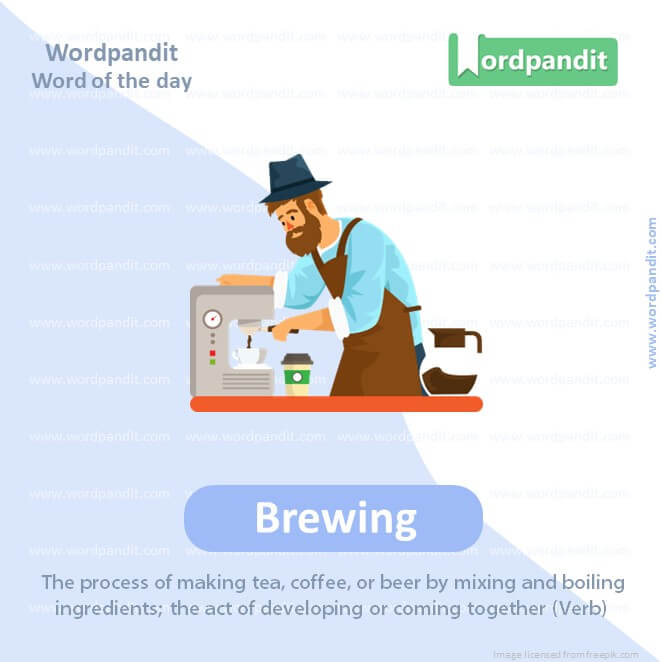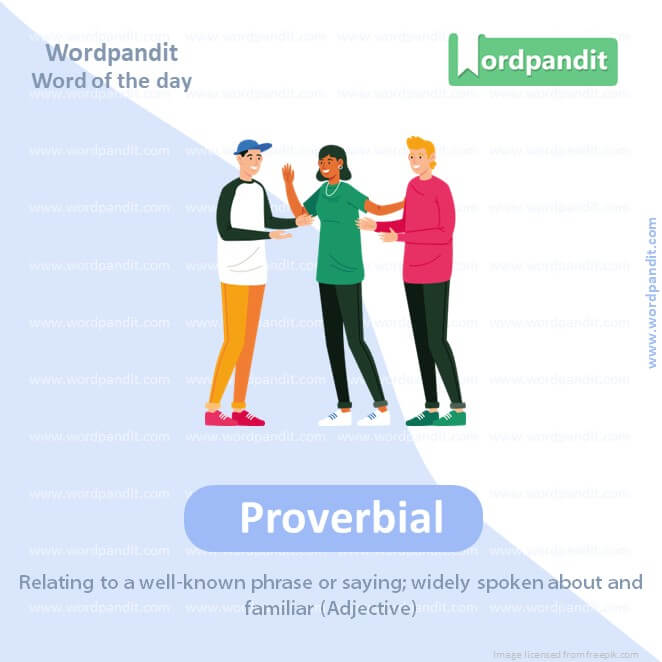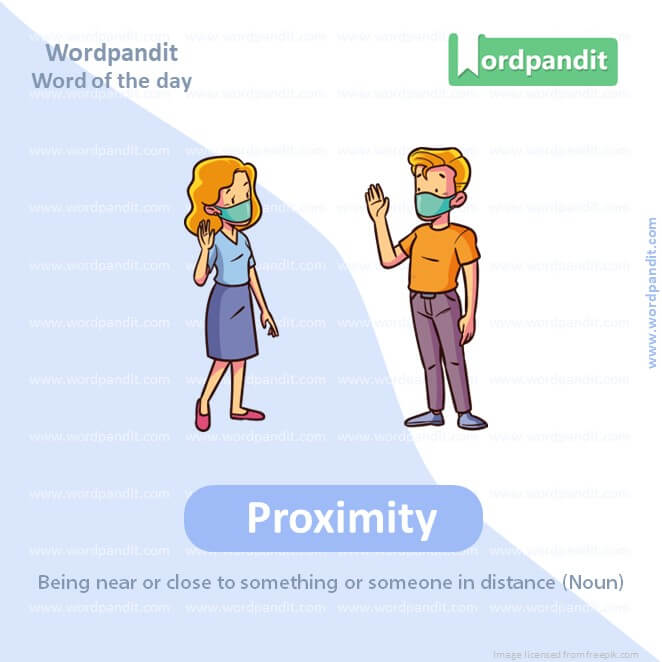Daily Vocabulary Words: List of Daily Used Words
Hi there. Welcome to this special section @ Wordpandit.
Our endeavour here is straightforward: highlighting important daily vocabulary words, you would encounter in The Hindu. This is your repository of commonly used words; essentially, we are posting a list of daily used words. Hence, this has significant practical application as it teaches you words that are commonly used in a leading publication such as The Hindu.
Visit the website daily to learn words from The Hindu.

WORD-1: Brewing
CONTEXT: Which is brewing against the DMK regime in the State, is expected to give it a fillip without causing any split in the anti-DMK votes.
SOURCE: The Hindu
EXPLANATORY PARAGRAPH: Imagine you’re making a big pot of your favorite soup. You add ingredients, mix them, and wait for it to cook. That’s a bit like brewing! Brewing is when you mix things together and wait for something to happen, like making tea or when a storm is getting ready to start.
MEANING: The process of making tea, coffee, or beer by mixing and boiling ingredients; the act of developing or coming together (Verb).
PRONUNCIATION: broo-ing
SYNONYMS: Steeping, Fermenting, Stewing, Preparing, Mixing
USAGE EXAMPLES:
1. Grandma is brewing her special herbal tea.
2. A storm is brewing on the horizon.
3. They spent the afternoon brewing a new type of beer.
4. There’s trouble brewing in the office.
WORD-2: Plunge
CONTEXT: Mr. Vijay has not openly committed himself to taking the plunge, he is being watched closely by many.
SOURCE: The Hindu
EXPLANATORY PARAGRAPH: Plunge is like when you jump into a pool really fast. You go straight into the water without stopping. It’s also like diving into something new, like starting a new game or trying a new food.
MEANING: To jump or dive quickly and energetically into something; to suddenly start doing something with enthusiasm (Verb).
PRONUNCIATION: pluhn-j
SYNONYMS: Dive, Jump, Submerge, Immerse, Descend
USAGE EXAMPLES:
1. She took a deep breath and plunged into the cold lake.
2. He plunged into his new project with excitement.
3. The stock market plunged yesterday.
4. They decided to plunge into learning a new language.

WORD-3: Proverbial
CONTEXT: the proverbial landlord, West Asians and much of the world, are currently in suspended animation wondering when and where the “second shoe” will drop and how big a crater it would cause on regional and global geopolitics and the economy.
SOURCE: The Hindu
EXPLANATORY PARAGRAPH: Proverbial is like a famous saying or phrase that everyone knows, like “The early bird gets the worm.” It describes things that are very well-known or commonly spoken about.
MEANING: Relating to a well-known phrase or saying; widely spoken about and familiar (Adjective).
PRONUNCIATION: proh-vur-bee-uhl
SYNONYMS: Famous, Well-known, Legendary, Renowned, Celebrated
USAGE EXAMPLES:
1. He’s the proverbial happy camper.
2. The proverbial elephant in the room.
3. She faced the proverbial uphill battle.
4. Their victory was a proverbial Cinderella story.

WORD-4: Prognosis
CONTEXT: We need to dwell on them briefly before making any prognosis of the crisis.
SOURCE: The Hindu
EXPLANATORY PARAGRAPH: Prognosis is like a guess about what might happen in the future, especially about someone’s health. Like when a doctor tells you how they think you’ll feel after you’re sick.
MEANING: A prediction about how something (like an illness) will develop; an educated guess about what will happen in the future (Noun).
PRONUNCIATION: prog-noh-sis
SYNONYMS: Prediction, Forecast, Diagnosis, Projection, Outlook
USAGE EXAMPLES:
1. The doctor gave a positive prognosis for her recovery.
2. The prognosis for the weather tomorrow is sunny.
3. He received a prognosis of complete healing.
4. The economic prognosis seems uncertain.

WORD-5: Proximity
CONTEXT: Qatar has developed some proximity with Hamas and the Palestine Islamic Jihad (PIJ), a sister militancy in Gaza.
SOURCE: The Hindu
EXPLANATORY PARAGRAPH: Proximity means how close you are to something or someone. Like when you sit next to your best friend, you’re in close proximity to them.
MEANING: Being near or close to something or someone in distance (Noun).
PRONUNCIATION: prok-sim-i-tee
SYNONYMS: Nearness, Closeness, Vicinity, Adjacency, Proximate
USAGE EXAMPLES:
1. The house’s proximity to the school was convenient.
2. They enjoyed the proximity of the park.
3. Proximity to the airport was a major advantage.
4. Their desks were in close proximity to each other.

WORD-6: Predecessors
CONTEXT: This ongoing conflict has proven to be far bloodier and more destructive than all its predecessors.
SOURCE: The Hindu
EXPLANATORY PARAGRAPH: Predecessors are people who did something before someone else, like the student who used your desk last year. They come before others in a job, a role, or a position.
MEANING: People who held a position or job before someone else; something that came before another thing in time (Noun).
PRONUNCIATION: pree-deh-suh-sors
SYNONYMS: Forerunners, Ancestors, Forebears, Precursors, Antecedents
USAGE EXAMPLES:
1. Her predecessors had established the company’s reputation.
2. The technology was developed by his predecessors.
3. She often referred to the works of her predecessors.
4. The building’s design was influenced by its predecessors.
WORD-7: Impenetrable</STRONG >
CONTEXT: It has been the first time that Israel has suffered a major intelligence and security failure since 1973, denting its fabled impenetrable security and omniscient intelligence set-up.
SOURCE: The Hindu
EXPLANATORY PARAGRAPH: Impenetrable is like a super strong wall that nothing can go through. It’s so thick or hard that nothing, not even light, can pass through it.
MEANING: Impossible to pass through or enter; very difficult to understand (Adjective).
PRONUNCIATION: im-pen-i-truh-buhl
SYNONYMS: Impassable, Dense, Incomprehensible, Indecipherable, Impervious
USAGE EXAMPLES:
1. The jungle was dense and impenetrable.
2. She faced an impenetrable mystery.
3. The code was impenetrable to hackers.
4. His expression was impenetrable.
WORD-8: Fabled
CONTEXT: It has been the first time that Israel has suffered a major intelligence and security failure since 1973, denting its fabled impenetrable security and omniscient intelligence set-up.
SOURCE: The Hindu
EXPLANATORY PARAGRAPH: Fabled is like a story that’s been told for a very long time and is famous, but might not be true. It’s like a fairy tale or a legend that many people know.
MEANING: Well-known from stories or legends; famous and often not real (Adjective).
PRONUNCIATION: fay-buhld
SYNONYMS: Legendary, Mythical, Famous, Renowned, Notorious
USAGE EXAMPLES:
1. The fabled city of Atlantis.
2. He searched for the fabled treasure.
3. The fabled beauty of the ancient ruins.
4. Her skills were almost fabled among her peers.
WORD-9: Omniscient
CONTEXT: It has been the first time that Israel has suffered a major intelligence and security failure since 1973, denting its fabled impenetrable security and omniscient intelligence set-up.
SOURCE: The Hindu
EXPLANATORY PARAGRAPH: Omniscient is like knowing everything there is to know, like a super-smart wizard who can answer any question you ask. It means understanding all things.
MEANING: Knowing everything; having unlimited understanding or knowledge (Adjective).
PRONUNCIATION: om-nish-ent
SYNONYMS: All-knowing, All-seeing, Wise, Informed, Enlightened
USAGE EXAMPLES:
1. In the story, the narrator is omniscient.
2. The omniscient point of view in literature.
3. She seemed almost omniscient about their history.
4. The guide was omniscient about local folklore.
WORD-10: Contemplate
CONTEXT: this time it has had to contemplate the real possibility of a combination of Hamas, the PIJ, Hezbollah and the Houthis with Iran-allied Shia groups harassing the American military presence in Iraq and Syria in tandem.
SOURCE: The Hindu
EXPLANATORY PARAGRAPH: Contemplate is when you think really deeply about something, like when you are trying to solve a hard puzzle or deciding which ice cream flavor to choose.
MEANING: To think deeply or carefully about something; to consider with attention (Verb).
PRONUNCIATION: kon-tuhm-plate
SYNONYMS: Ponder, Consider, Reflect, Deliberate, Muse
USAGE EXAMPLES:
1. She sat quietly, contemplating her future.
2. He often contemplated the stars at night.
3. They contemplated the possible outcomes of their decision.
4. Contemplating the meaning of life is a common philosophical exercise.
vocabulary upsc
The Union Public Service Commission (UPSC) examination represents a significant milestone for many aspirants across India. Part of the journey to success involves comprehending and utilizing a robust ‘vocabulary UPSC’ that can set competitive exam takers apart from the crowd. Let us delve into the nuances of how this essential resource can be mastered effectively.
For starters, one has to understand the significance of ‘vocabulary UPSC.’ This is much more than rote learning a word list. It’s about understanding the connotations, the nuances, and the context in which these words are used. This understanding can greatly improve not only your comprehension skills but also your performance in the English language section of the The Union Public Service Commission exam.
Following the understanding stage, come practice and revision. ‘Vocabulary UPSC’ learning cannot occur overnight, and it is essential to devote a specified time daily to learn and review new words. Incorporating vocabulary-learning into your daily study habit can help you enhance your linguistic skills and aid in long-term retention.
Another much-needed approach to ‘vocabulary UPSC’ is using the learned words in regular communication. This method reinforces learning and aids retention. Additionally, creating a personal word diary where you note down new words, their meanings, and context can serve as your go-to guide for revision.
One common misconception about ‘vocabulary UPSC’ is that it’s only limited to English. However, it is vital to understand that the concept extends beyond languages. Terms used in subjects like History, Geography, or Economics should also be part of your vocabulary repository. This multifaceted conception can significantly aid in developing a comprehensive understanding of subjects, ultimately resulting in a higher score.
In conclusion, mastering ‘vocabulary UPSC’ requires consistent effort, deep understanding, and practical application. The journey to UPSC success is not just about learning; it’s about knowing how to use your learning effectively. So, embark on this discovery with a clear goal and unwavering dedication, and success will surely be yours.











